

Weaver's Pride
Prisca (SVC) Chigozirim@chigozirimprisca614699
1 year ago
In the broad landmass of Ogun, a Yoruba land in Nigeria, there lived a skilled weaver named Femi. He was renowned for crafting exquisite garments from natural fibers – cotton, hemp, and silk – sourced from local textile farmers and traders.
Femi's latest creation was a stunning Akwete cloth, woven with precision and passion for textiles. He carefully selected the finest threads, dyed with plant-based colors, to create an intricate pattern that told the story of his ancestors.
Before that, Obinna, a young Igbo man, had sought out Femi's expertise for a special occasion – his traditional wedding. He wanted a garment that reflected his heritage and values.
Femi surprised Obinna with a majestic Agbada, made from the Akwete cloth. The Akwete was an old textile Femi's grandma used during her maiden age. Instead of Femi to dispose of the old Agbete material, he made a magic Agbada out of it for Obinna. The outfit exuded elegance, comfort, and sustainability.
As Obinna admired his reflection in this Agbada, Femi shared the story behind the fabric:
"This cloth is more than just a beautiful design. It represents our connection to the land, our people, and our traditions. By choosing natural materials, we reduce waste and support local traders too."
"Mind you, foreign male and female attires are beautiful, but we should not neglect our betrothed local textiles. It is our identity, our reality. And surprisingly, this was a gift from my great grandma to my grandma on the day of her marriage."
Obinna's eyes widened with wisdom and understanding. "I never thought about fashion as a way to promote sustainability and cultural pride."
Word spread about Femi's remarkable garments and the story behind them. Soon, young men and women sought him out, eagerly waiting to wear the clothing that reflected their heritage and values.
Femi's workshop became a hub for sustainable fashion, African culture, and community building.
As the movement grew in Femi's hand, so did the benefits.
Local traders thrived, supplying natural fibers, waste was reduced, as garments were crafted to last, and cultural heritage was preserved through traditional designs.
Soon, young Africans reclaimed their identity, proudly wearing their roots.
Femi's weaving became a symbol of resistance against fast fashion's destructive ways. His story inspired a new generation to cherish African craftsmanship, sustainable living, and cultural pride.
Obinna, now a proud ambassador of Yoruba fashion, wore his Agbada with dignity, knowing he supported a movement that wove together tradition, community, textile stories, and the environment.
#NircleStories
#AfricanDrama
#AfricanFashion

